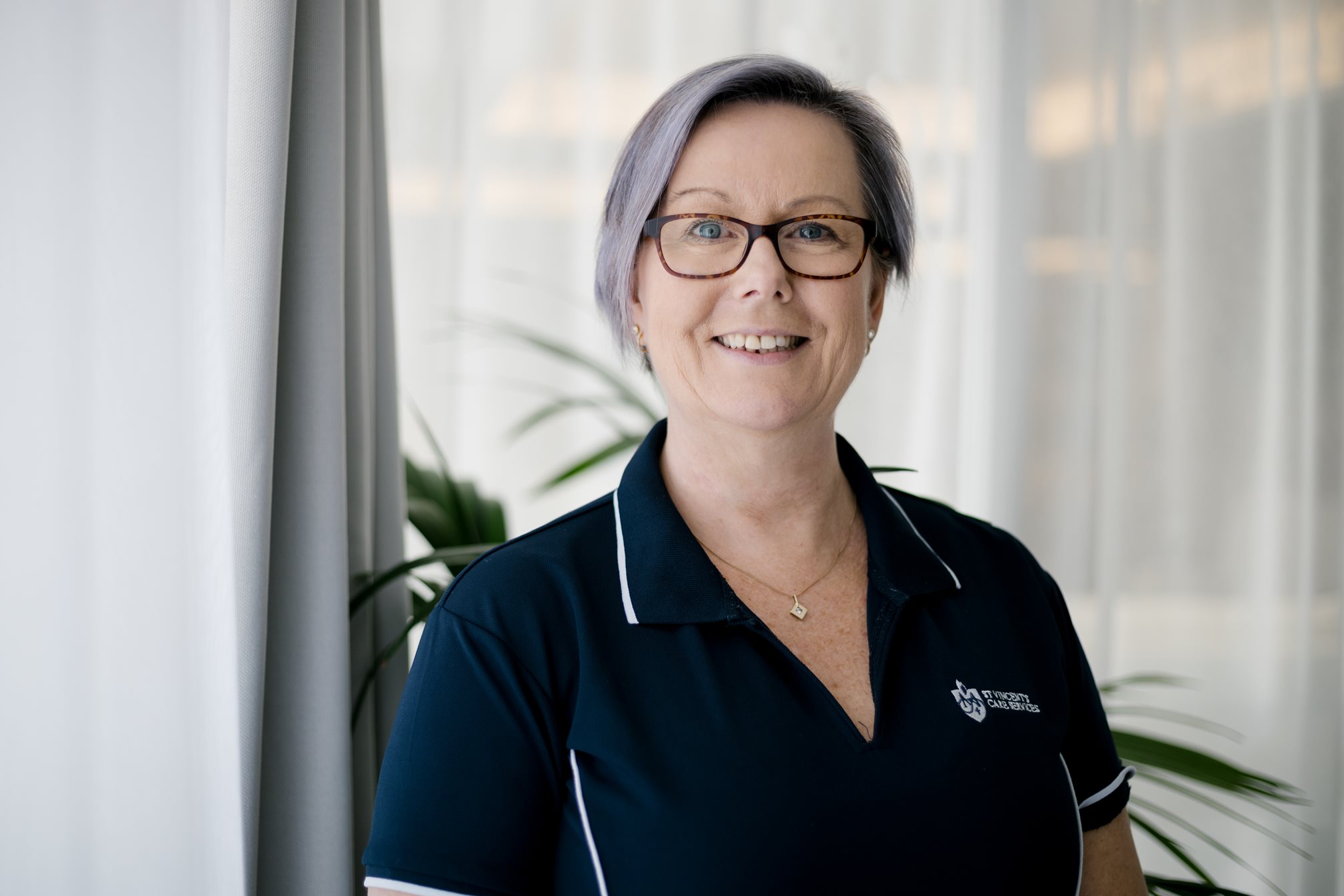How to Prepare for the Transition to Aged Care [6 Helpful Tips]
Moving grief | Finances | Setting expectations | Personalisation | Paperwork | Getting help
Posted 5th December 2023 | 5 minute read
By Jesse Gramenz Reviewed by Julie Dymock
Reviewed by Julie Dymock

The move to aged care is worthwhile, but can be really challenging. By getting ahead of things and preparing for the transition, you can minimise your stress for yourself, your loved one and your family. Let’s get started.
1. Acknowledge the real grief of moving out of home
Realistically, aged care isn't the family home. It can't be. We can't replace something so special for your parents and so full of memory. So, when the time comes for Mum or Dad to move into aged care, they may mourn the loss of their home. To them, it can be felt as deeply as losing a best friend.
With that in mind, think about ways that you can help them come to terms with that loss:
- Hold a farewell party for the house with slideshows and photos of all the good times they shared there
- Create a memory book or slideshow for them to keep when they make the move
- Make sure they take any small keepsakes that mean something to them like family albums, garden ornaments or similar
While it still won’t be easy saying goodbye to the family home, it will always help Mum & Dad to know that the move away from home is as important to you as it is for them.
2. Understand the financial implications of an aged care move
When it comes to paying for aged care accommodation, some people pay the entirety of their accommodation costs. Others pay a percentage. You may even have the costs of your accommodation covered completely by the government. It all depends on your income and assets.
Because of how varied your options are when it comes to aged care finances, it's important you get on top of it early.
- Do an income and means assessment as soon as you can.
- Involve a financial advisor in your decision making. They can advise on the best way to manage the transition to aged care financially including looking at potential tax implications & exemptions.
- Keep talking with your chosen aged care provider. They will also be able to offer some advice based on other people's experiences moving into aged care.
- Consider not just the basic costs and fees, but any additional extras that can make Mum or Dad's stay more pleasant like access to Foxtel, Netflix, drinks & room service.
>Learn more about aged care costs
3. Set expectations for adjusting to life in aged care
At St Vincent's, our experience tells us the first 30 days are often the most difficult for new residents.
Quite often, new residents are:
- Grieving the loss of their home, independence, mobility, health & identity
- Not having their expectations met or having different expectations of what aged care is like
- Losing their purpose in responsibilities through chores and routines
- Dealing with changes in familiar food
- Having old routines interrupted through a massive life change
But as we say to pretty much everyone: trust us, it does get better. What’s important is to know that new residents will be going through a lot of emotions. Because of that, you need to be able to set realistic expectations.
Clinical Manager Julie says:
“What amazes me about people moving into aged care is their resiliency. Moving to aged care is a big life change and yet residents make it work time and time again. Resiliency is such a loveable quality and residents have it in an abundance.” |
3 ways you can help set realistic expectations
- Find aged care homes near you to tour so that you can get the clearest idea of what they're like. Either bring your parents along or take lots of photos.
- Research lots. Talk with your parents more.
- Be honest. Aged care isn't going to be like the home they left behind, but that doesn't mean it can't be a good thing. For many, finding a community, routine and a steady diet can all be things that make life even better.
Read on:
- Find examples of aged care with our top aged care homes in Sydney
- 3 Tips For Adjusting to Life in Aged Care [With Advice From a Facility Manager]
- 5 Tips For Sons or Daughters Whose Parents Are Moving Into Aged Care
4. Personalise your aged care experience (before you move!)
Every aged care provider is wanting to know one thing:
How can we make you most comfortable?
And for a provider, personalizing the aged care experience means making aged care as much like your own home as possible.
Here’s 7 things you can do to help your aged care provider do the best possible job:
- Learn about care plans -- they will be the one things that helps you keep track of the care your loved one is receiving and whether their preferences are being taken into account
- Be as detailed as possible when sharing with the aged care provider about food preferences, hobbies etc.
- Make a plan with the home about what the first 30 days looks like especially when it comes to activities
- Help your loved make their mark on the home early on by being involved in gardening (planting their own tree or flower), getting their picture on the wall and helping them to create something like art, pottery etc. depending on their preferences
- Organise for your loved one to try out different groups in the home. This could be knitting, writing, walking etc. to not only start/continue a hobby, but to meet new people and feel comfortable sooner
- Organise what family photos, keepsakes etc. you can take -- while you're mostly limited to smaller items to bring you might even be able to bring your favourite chair. Check with your aged care provider!
Note: There is no rush to get used to living in aged care! If Mum or Dad don't feel comfortable eating with or spending time with other people at first, that is totally fine. Remember that the move to aged care comes with its own set of grief and we acknowledge together how difficult that can be
5. Do the paperwork... early!
When it comes to paperwork in aged care, there’s a lot to get through at different stages. Knock over what you can early and save yourself stress and heartache. You absolutely want to have the time and headspace to be checking in on Mum or Dad when they move in, not catching up on signing dotted lines.
A good aged care home will want to find out as much as they can about a resident BEFORE they move in. The last thing you want is for Mum or Dad to feel overwhelmed getting asked a million questions about:
- Their health
- Food preferences
- Activity preferences
- Their life story and background
... all in the first day!
The more that can be done prior to moving in, the easier the transition will be. Whether that's providing information about medication or about how Mum likes an earl gray tea when she watches the evening news, the more a provider knows early, the better.
> Learn more about care plans in aged care
6. Don't do it all alone
While you might be the main contact for the aged care transition, lean on others for help where you can -- an aged care transition isn't something you should go through on your own.
- Family
- Friends
- Aged care providers
- Financial advisors
- Aged care brokers
- Government support services
All of these (and more) can be invaluable sources of support. Get the help you need and minimise the stress and worry of an aged care move.
Parting Thoughts
Transitioning to aged care can be a challenging journey. But by being prepared for some of the common things people forget to consider along the way, you put yourself in a position to navigate it with as little stress and worry as possible.
Clinical Manager Julie says:
“When it comes to aged care, you might just surprise yourself that it's better than you thought.” |
Still have questions?
CHAT TO OUR AGED CARE EXPERTS
- Home
- Residential Aged Care
- How To Prepare for the Transition to Aged Care [6 Helpful Tips]
Helpful Information
.jpg)
How to Talk About Aged Care With Your Parents

Staff and Qualifications
.jpg)